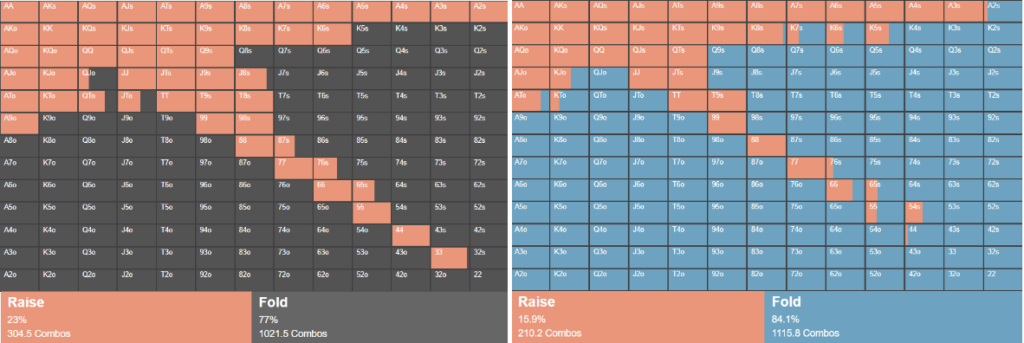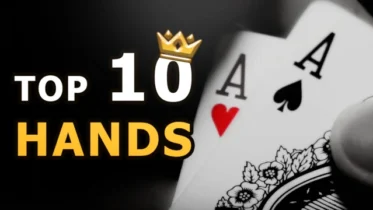A question I am often asked by new poker players is whether they should play cash games or tournaments. It is important to realize that how one profitably approaches tournament poker is vastly different than how one approaches cash games, simply studying one variation of poker will not prepare you for all variations. Knowing the key differences between cash games and tournaments will help you in knowing which form of poker you should specialize in.
The Difference In Variance Between Cash Games And Tournaments
The Variance Of Poker Tournaments
One of the biggest differences between cash games and poker tournaments is that tournaments have a much more significant rate of variance than cash games. In a poker tournament with 100 players, you only win decent money when you finish in the top 3-5 spots. With significant payouts being limited to just 3-5 spots, on average you will only experience a good payday one out of twenty tournaments.
Now imagine you are playing in poker tournaments with even more entrants, like 1,000 or more. The bigger the fields, the less often you will finish in one of the top spots.
Although being skilled and well-studied can help you increase your rate of significant cashes in poker tournaments, it will still only be a fraction of the time even if you are one of the best in the world.
The Variance Of Cash Games
Cash games, unlike poker tournaments, have much less variance. If you are more skilled than your average opponent, typically you will have a profitable session 50% of the time. Not only will you win half of the time, but you will usually win more money in your profitable sessions than you will lose in your losing sessions.
With the differing variance dynamics between both cash games and tournaments, it is important to consider how consistently you want to win. If the idea of prominent losing streaks sounds daunting to you, you may be better equipped to play cash games. Especially if you want to play for a living and have a small bankroll, cash games are the best thing for you to play.
Poker Tournament Strategy Versus Cash Game Strategy
The Impact Of The Rake
If you are a cash game player transitioning to poker tournaments, you must change your strategy in order to be successful. The structure of a poker tournament is vastly different than the structure of a cash game. In every hand of a cash game, a percentage of the pot is taken out to account for the rake, a variable not present in poker tournaments. Since a small portion of the pot is taken out of every cash game hand, naturally poker tournament pots are slightly bigger than cash game pots, a factor worth considering when making decisions.

(Left to Right) GTO Tournament Chart 80 Big Blinds Effective, GTO Cash Game Chart 100 Big Blinds Effective
Even with a bigger stack in the same position (hijack), the Cash Game Chart maintains a tighter range
Examining the above tournament and cash game charts, you will see how despite stack size and position being identical, you maintain a wider range in a tournament as opposed to a cash game. With the size of tournament pots being larger than cash game pots, you get to play a wider range since there are more chips to be won.
The differing ranges between cash games and tournaments produces different preflop strategies between the two variations. Some of the best poker tournament players play a loose, aggressive (LAG) strategy while the best cash game players play more tight. Even the loosest cash game players are still not as loose as LAG tournament players.
Assessing Your Skill Level In Poker Tournaments
Let’s say you start grinding poker tournaments, with buy-ins starting at $10. You start out hot, winning two in a row for a total of $2,000. With the sudden bankroll increase, you move up to $20 tournaments and happen to win one of the first ones you play. Again, coming off of a big score, you move up stakes yet again. While you may all of a sudden be bankrolled for these higher buy-in tournaments, it does not mean you are at the necessary skill level to play them regularly.
While the variance of poker tournaments can swing in the negative direction, it can also swing the other way as you experience “hot streaks”. Even when you are tearing it up on the tournament felt, it is important to recognize your skill level and stay within the stakes that you can not only afford, but beat. Some of the best tournament players in the world have the skill, but experience the negative side of variance in the late stages of power tournaments, keeping them from winning and moving up.
The variance of poker tournaments can make it difficult to accurately assess your skill level, as opposed to cash games where it is much easier to track your win-loss rate between each session. Often how well you do in a poker tournament will come down to one flip, a significant dynamic you must be prepared for if you want to specialize in tournaments.
Being Prepared For The Time Commitment Of Poker Tournaments
When playing a cash game, you have the luxury to exit the game at your leisure. When you play a poker tournament, your time at the table ends when either you get eliminated or you make it to the very end winning first place.
Although winning first place is always the end goal when you play a poker tournament, winning a tournament means you invest the most time playing out of any other player who happens to enter. With how poker tournaments are designed to be played, they are way more of a time commitment than cash games.
Studying Cash Game And Poker Tournament Strategy
Poker tournaments require you to study a diverse array of scenarios. Throughout a poker tournament, many variables like stack size are constantly in flux presenting you with a plethora of different situations to prepare for whether preflop or postflop.
At a cash game table, stack sizes are incredibly consistent as most players will be willing to “add on” to have a similar stack size to their opponents. If you look at almost any online cash game, you will see players sitting at least 100 big blinds deep due to minimum buy-in requirements and their opponent’s stack sizes.
Naturally, cash game players almost exclusively specialize and study deep stack poker strategy as there would be little point in studying short stack play. Many poker players label the study of cash game strategy as boring due to the lack of diverse spots to study. While cash games require you to be well-versed in how to play specific situations, the tendency of tournaments to produce a wide variety of scenarios can make tournament study much more compelling.
Bankroll Considerations For Tournaments and Cash Games
Your bankroll is an important factor when it comes to choosing between both tournaments and cash games. If you are new to poker, it is worth considering how much variance you can handle and afford. Due to the lower variance and complexity, cash games are the better option for new poker players who are just starting out. Even if you are not that good of a player, you can still win between $10 to $20 an hour playing $1/$2 or $1/$3. $20 an hour is a decent amount of money if your goal is to make money playing poker!
Considering volume, cash games are by far superior to tournaments as achieving high volume is much easier. If your local poker room only runs one tournament a day, you are going to struggle getting in a lot of volume as opposed to sitting down at a cash game that is always running.
While cash games are likely a better entry point for new players, it is still important to note that online cash games are a lot more difficult than live ones. If you can afford it, start at $1/$2 live and go from there.
If you have acquired a large bankroll that can handle the variance, you may be in a position to pursue tournaments full-time as opposed to cash games. While a solid and consistent win-rate in cash games may be a good enough reason to keep playing them, if you have hit a cap in earnings and don’t want to go to the trouble of finding/playing private, high stakes cash games, it may be worth pursuing tournaments.
If you are at the point where you are playing at medium and high stakes, consider playing in tournaments as long as you are prepared for the variance and time needed to study/play.
Playing Satellite Poker Tournaments
If you are looking to break into the poker tournament scene, it is worth researching to see what satellite tournaments are being offered whether that be for online or live play. Being able to play a tournament outside of your bankroll can give you a huge return on investment if you satellite in and make the money. Some players even make good money winning satellite tournaments and selling the tickets at a discount to other players.
If you enter a satellite tournament, be sure you note that they should be played differently than normal poker tournaments. If you are playing in a 100 player tournament and 10 players win seats to a bigger tournament, there is no need to “play for first” as the player who finishes in first and the player who finishes in tenth win the exact same thing.
Conclusion: What Worked For Me
I am often asked by aspiring poker players “Jonathan, how did you get to where you are today?” Well, despite the fact I am notably known as a two-time World Poker Tour champion, I actually got my start playing cash games.
Back when I was living in Las Vegas, I would go to the Bellagio at noon every day and play any $5/$10 cash game that was running. If a $5/$10 cash game was not running, I would tell the poker room staff I wanted to start a game and was willing to play anyone, and would eventually get to grinding once a game started. I would play 10-12 hours straight, and would then repeat the same process the next day.
I repeated this process every day and eventually moved up to higher stake cash games. Once I had grown my bankroll to a large enough amount to start playing tournaments consistently, I made the switch and would go on to have great success.
If your goal is to play what you enjoy and have fun, it does not matter whether you play tournaments or cash games. Often I hear players talk about how they prefer tournaments as they enjoy the thrill and feel like they are “clocking in” every time they play cash games. While it is perfectly fine for them to keep playing what they enjoy, in the long run it is not likely they will make the money necessary to pursue professional poker.
With anything in life, if you want to be successful you must be willing to put in the time and do what is necessary to succeed. If your ultimate goal is to make it as a professional poker player, consider focusing on cash games when you are just starting out. Once you build up your bankroll and are prepared for the commitment and variance, see what tournaments are available to you and fire some bullets.



